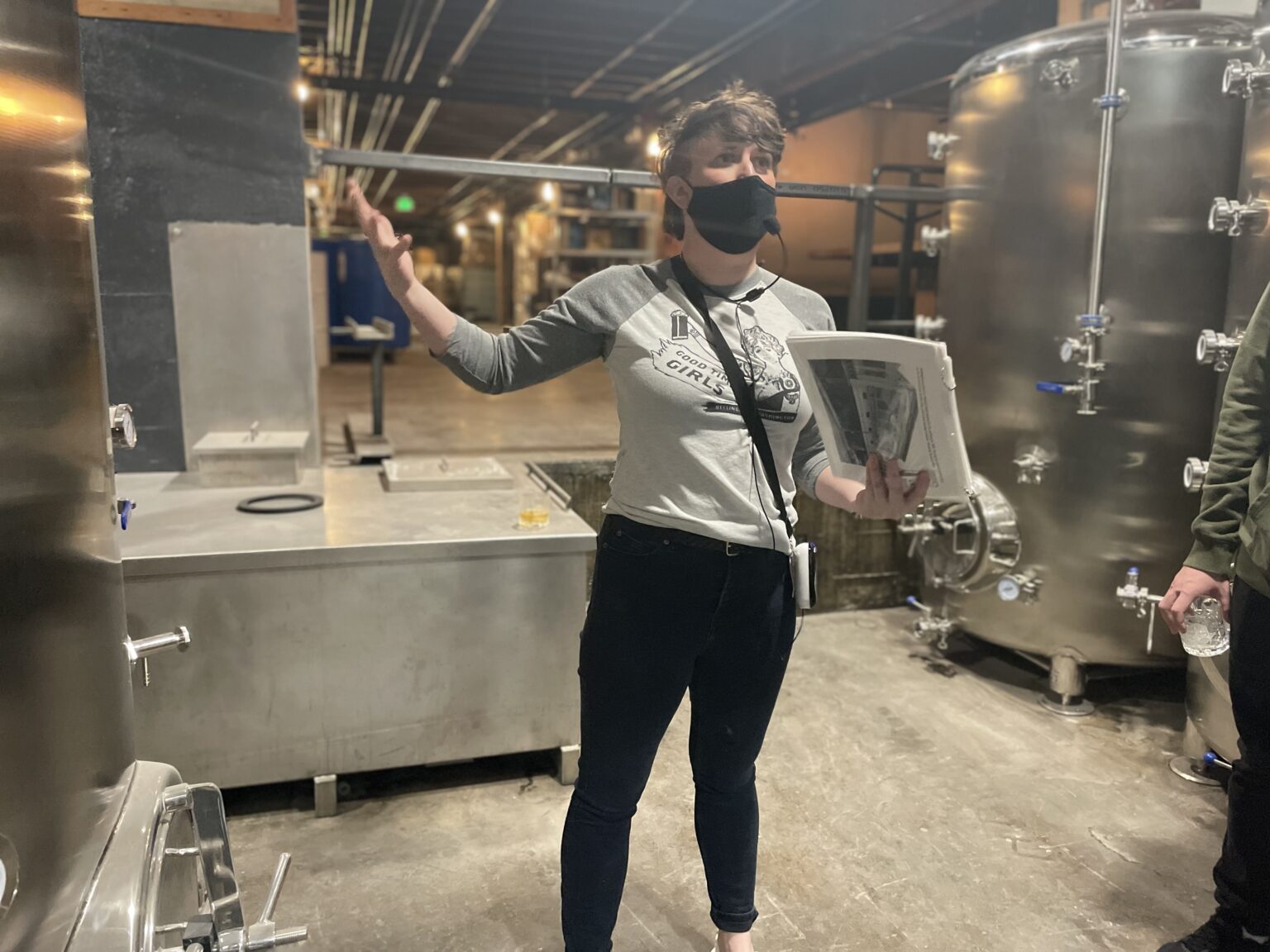I first sipped spirits crafted by Chuckanut Bay Distillery near the end of a “Sin & Gin” historical walking tour led by the Good Time Girls through downtown Bellingham. Visitors weren’t allowed beyond the small tasting room, which at the time was located off the alley behind Railroad Avenue, adjacent to Boundary Bay Brewery’s beer garden. But after sampling a trio of the “grain-to-glass” elixirs created by longtime friends and business owners Matt Howell and Kelly Andrews, I sensed magic was happening on the other side of the closed doors.
Years passed before I finally got a behind-the-scenes look at what it takes to turn locally grown agricultural products into award-winning spirits such as potato and wheat vodkas, gin, bourbon, whiskey and assorted liqueurs. A lot has changed between then and now. Instead of operating from the basement of Rumors Cabaret, Chuckanut Bay Distillery currently crafts their award-winning spirits in an 18,000-square-foot space at 1311 Cornwall Ave.
Howell’s and Andrews’ vision since they purchased the historic building in 2017 has also expanded, which is something people can find out more about during guided tours of the storied space at 4 p.m. most Saturdays.
On the January afternoon my date and I were in attendance, Good Time Girls co-owner Wren Urbigkit focused on everything from the multifaceted distilling process to the building’s rich past and Howell’s and Andrews’ ambitious plans for its future, which includes eventually opening a cocktail bar and a 6,000-square-foot event space.
After meeting in the distillery’s wood-paneled tasting room ― where guests temporarily lowered their masks to sip mini-cosmopolitans from small souvenir glasses ― Urbigkit led us through tall doors into the distillery. Everywhere I looked, silver stills, silos, tanks and other mysterious machines gleamed underneath the bright lights.
Astutely observing that the scene resembled Willy Wonka’s Chocolate Factory, Urbigkit said that while we wouldn’t be floating down a whiskey river during the 90-minute tour, we would be served another mini-cocktail once we descended into the basement (we were, and the classic whiskey sour hit the spot).
“We try to do our history with a little bit of liquor, a little bit of humor,” she said. “I’m known for my cursing, but if it’s too much, let me know.”
Before doing a deep-dive into the intricacies of the building’s history and the multiple steps that must be taken to create grain-to-glass spirits, Urbigkit asked if anyone had noticed the bicycle on a perch in the tasting room. Most of us nodded, and she noted that the simple yellow bike frame represented a whole lot of hard work.
“[Howell and Andrews] started as hobbyists,” she said. “They were buying equipment, but it was expensive. And then when it came time to buy a commercial-grade grinder for the potatoes, it was a little too expensive. Matt hooked up an apple grinder to that bicycle, and he bicycle-ground 13,000 pounds of potatoes.”
His herculean efforts paid off. When the initial batch of vodka made from Skagit Valley-grown Yukon gold potatoes won double gold at the New York International Spirits Competition, Howell and Andrews knew they were creating something special.

Chuckanut Bay Distillery and the Good Time Girls both celebrated their 10th anniversaries in 2021, and Urbigkit said it was the perfect opportunity to team up again. After all, Howell and Andrews are committed to returning the 111-year-old building they own to its former glory, and Urbigkit and co-owner Kolby LaBree are intent on keeping alive the lore of Whatcom County’s places and people.
On the history side of things, we learned we were standing in the former Bellingham Chamber of Commerce building; that Cornwall Avenue used to be called Dock Street and was connected to the Dock Line trolley — reminiscent of Chuckanut’s Dock Line Sweet Whiskey — and also that the building was home to J.C. Penney from 1922–1955.
Before-and-after photos and stories from across the decades touched on the city’s transition from the Wild West — including a thriving Red Light District and lots of horny, bearded men — into a more moral-minded metropolis. Also discussed was the Mount Baker Marathon’s dangerous debut, a mountain goat mascot, and the sorry state the building was in before the work began to transform it into a distillery. To that end, prodigious amounts of pigeon poop, a 3-foot-thick facade, a boarded-off basement and “decades of cobwebs” were mentioned when it came to cleanup.
Chuckanut employee Lindsey Rust joined the second part of the tour to explain more about the process of turning potatoes, grains and corn into award-winning spirits. Mashing, grinding, fermentation, distillation and bottling were covered, and participants got to tour the long and narrow barreling room, where we were cautioned to keep our hands off the merchandise (and were informed what a “bunghole” is).

Throughout the tipsy tour, it became clear the attention to detail Howell and Andrews have poured into their business doesn’t end with what they serve and sell from their tasting room. In addition to the “slow-crafted, no shortcuts” ethos they bring to crafting their spirits, they’ve salvaged and reused what they can from the enormous edifice, and are committed to restoring all 18,000 square feet of it.
“As historians and people who follow these buildings really closely, it’s hard to find people who will put this kind of work into a building,” Urbigkit said. “And the staff and owners are doing almost all of it.”
“It has been amazing working with Chuckanut Bay Distillery,” LaBree added. “They have a real DIY ethos that we relate to. It has been awesome for us learning about the process of distilling and they have enjoyed our historical additions to the tours, as well. In a nutshell, they like history, we like spirits, and people like both — equal matches made in heaven.”
To procure tickets to the Chuckanut Bay Distillery Tour, go to www.chuckanutbaydistillery.com or www.bellinghistory.com




